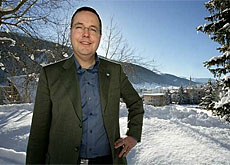WEF aims to set agenda in a shifting world

André Schneider, managing director of the World Economic Forum (WEF), talks to swissinfo about the highlights of the annual summit in Davos.
The former classical musician, who has worked for the forum since 1998 and has been a board member since 2003, explains why the WEF remains a unique forum for leaders from the political and business world.
Climate change, energy and terrorism, as well as the Middle East are expected to dominate the five-day talks which start on Wednesday.
swissinfo: Last week Klaus Schwab, the forum’s founder, talked about an “increasingly schizophrenic” world. What exactly did he mean?
André Schneider: Well, on the one hand, many people feel that things are not moving in the right direction. But at the same time, world growth figures are among the most impressive for years, and in Switzerland, for example, unemployment is almost at its lowest level on record.
In other words, our impression is that certain observations do not always match reality.
swissinfo: But when you talk about schizophrenia, doesn’t that mean that the world is in decline or that the WEF has lost its sense of optimism?
A.S.: No, not at all. What I see is a small divergence between certain economic facts and people’s perception.
You can also see it in the reactions of certain governments that suddenly want to obstruct world trade, even though economic growth is the natural result of such exchanges.
swissinfo: Several key Israeli and Palestinian political decision-makers, including the Palestinian president, will attend the WEF. Can we expect any breakthroughs?
A.S.: It’s far too early to say. The main thing for us is to provide an informal, open platform for discussion.
The kind of platform we offer is intended not only for governments, but also for business and civil society groups, allowing them to meet and lay the foundations for future initiatives.
swissinfo: But do you have any particular expectations ahead of the summit?
A.S.: We are actually continuing our normal strategy. Our aim is to show how very important it is for all actors to remain flexible and to avoid being pigeonholed in their respective fields.
The business world, for example, has to play both a political and social role. There has to be this kind of general exchange to find proper long-term solutions to today’s big questions.
swissinfo: The slogan for next week’s WEF seems to be the “shifting power equation”. What does this mean?
A.S.: It’s referring to the new roles of Asia, Latin America and Russia, the issue of energy security, and the need to think about combining world growth that favours developing nations with proper environmental protection.
swissinfo: A key development at the moment is the shift in power towards the Asia-Pacific region. Is Davos, a Swiss resort in the middle of Europe, the right place to bring together the world’s decision-makers?
A.S.: Of course. Even though such a power shift seems to be taking place, Europe still remains a major economic force.
In reality, Asia is still a long way off from reaching the development levels of the rest of the world. You also need to remember that outside Asia, Latin America and Russia are showing strong growth.
Davos and Switzerland, as a neutral country, represent a unique platform to bring everyone together for open, informal talks.
swissinfo: The forum is hosting more than 220 meetings, talks and workshops covering a multitude of issues. How do you decide what to cover?
A.S.: It’s a very long participative process. First of all, we analyse the main results of discussions launched the previous year.
Our teams then travel the globe to meet WEF members, partners, academics and politicians to identify any new issues.
But it has to be stressed that, implicitly, there is a great sense of continuity. In 2005 we began to outline the main challenges.
In 2006 we highlighted the need for creativity and new ideas so that things can evolve over time. This year we’ve had to take into account all the major changes that we are currently facing.
swissinfo-interview: Pierre-François Besson
Four Swiss cabinet ministers will be attending the Davos meeting.
Foreign minister and this year’s president, Micheline Calmy-Rey, will give the opening speech and spend time networking.
Economics Minister Doris Leuthard will meet informally with 30 ministers from World Trade Organization members to try and kick-start stalled negotiations.
Finance Minister Hans-Rudolf Merz will meet with business representatives and hold talks with his German counterpart Peer Steinbrück and EU commissioner Charlie McCreevy.
Defence Minister Samuel Schmid will visit troops guaranteeing security around Davos, and meet the US Homeland Security boss Michael Chertoff and the New Zealand defence and trade minister, Philip Goff.
The World Economic Forum (WEF), formerly the European Management Symposium in Davos, was founded by Klaus Schwab in 1971.
The annual WEF summit takes place in the Swiss resort of Davos, but in 2002 the meeting was held in New York – the site of the September 11, 2001 attacks four months earlier.
The controversy over the past few years whether the mountain resort is the right venue for WEF meeting has died down.
The 2007 WEF summit takes place in Davos from January 24 to 28. It is expected to attract about 2,400 participants, including 24 heads of states, 85 ministers and top business leaders, as well as over 400 researchers and representatives of civil society.

In compliance with the JTI standards
More: SWI swissinfo.ch certified by the Journalism Trust Initiative










You can find an overview of ongoing debates with our journalists here . Please join us!
If you want to start a conversation about a topic raised in this article or want to report factual errors, email us at english@swissinfo.ch.